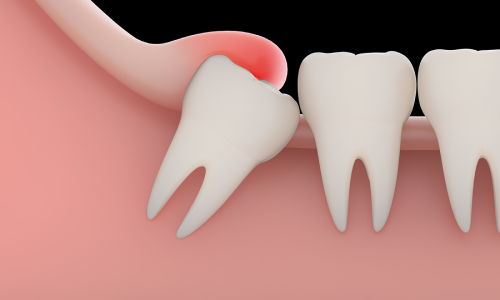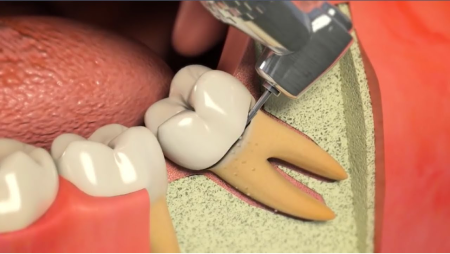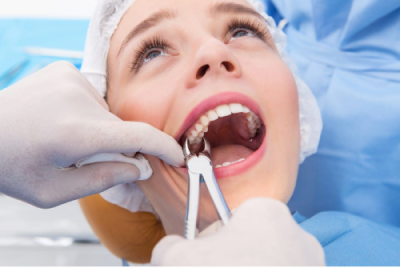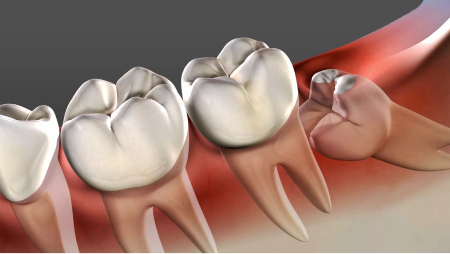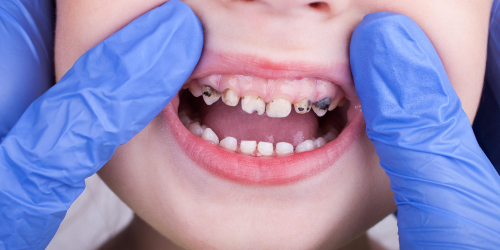IMPACTED TOOTH EXPOSURE
Impacted Tooth Exposure in Salt Lake City and South Jordan
An impacted tooth is like a hidden tooth. It’s a tooth that’s stuck or blocked from coming out properly in your mouth. It might cause pain, swelling, or other problems and often needs to be removed.
Causes of an Impacted Tooth
The primary causes of impacted teeth are typically related to a lack of space in the jaw. The most common type of impacted tooth is the third molar, or wisdom tooth, which often doesn’t have enough space to fully erupt. Other teeth may become impacted due to overcrowding, abnormal tooth growth angles, or the presence of obstacles like cysts or abnormal growths in the jawbone. Genetics can also play a role in determining whether a person is more prone to impacted teeth. Impacted teeth can lead to pain, discomfort, and potential dental issues, necessitating dental intervention or extraction in some cases. If you live in the Salt Lake City or South Jordan areas and need help with a third molar or impacted tooth, request an appoint by clicking the button below.
Signs You Might Have an Impacted Tooth
- Pain and Discomfort: One of the most prevalent symptoms is persistent pain or discomfort in the back of the mouth, especially in the area where the impacted tooth is located. This discomfort can range from mild to severe and may come and go.
- Swelling and Tenderness: Swelling of the gum tissue around the impacted tooth is common. The affected area may also be tender to the touch, making it painful to brush or floss.
- Difficulty Opening Your Mouth: Impacted teeth can cause stiffness or limited jaw movement, making it difficult to open your mouth fully or comfortably.
- Unpleasant Taste or Odor: An impacted tooth can create pockets where food debris and bacteria accumulate, leading to a foul taste or bad breath.
- Headaches and Earaches: The pain from an impacted tooth can radiate to nearby areas, causing headaches, earaches, or pain in the neck and shoulders.
- Gum Infections (Gingivitis or Pericoronitis): When an impacted tooth partially emerges, it can create a flap of gum tissue that traps food and bacteria, increasing the risk of gum infections. This condition is known as pericoronitis and is characterized by redness, swelling, and pus around the affected area.
- Difficulty Chewing: Impacted teeth can interfere with your ability to chew properly, leading to discomfort or pain while eating.
- Unexplained Toothache: Sometimes, the pain from an impacted tooth can be mistaken for a different dental issue, leading to unexplained toothaches in the back of the mouth.
Treatment for an Impacted Tooth
Treatment for an Impacted Tooth
- Diagnosis: A dentist will start by conducting a thorough examination of the affected area, often using X-rays to determine the position and orientation of the impacted tooth. This assessment helps in planning the appropriate treatment approach.
- Pain Management: If the impacted tooth is causing pain or discomfort, the dentist may prescribe pain relievers or antibiotics to address any existing infection or inflammation.
- Procedure: The solution for an impacted tooth depends on its location, the size of the patient’s jaw, and their overall oral health. Ideally, the periodontist will attempt to save the impacted tooth by removing the gum on top of it, thereby exposing the tooth. An orthodontic bracket will then be bonded to the exposed tooth’s surface, and a tiny chain with a rubber band will be attached to the bracket and to an orthodontic archwire. The tension on the chain will very gradually move the tooth into position, just as if it had normally erupted. Extraction of the tooth may be necessary in certain situations.The procedure will be performed in the periodontists’ office using nitrous oxide ( laughing gas) or IV sedation and a local anesthetic and will take about 90 minutes to two hours to complete.
- Recovery: The recovery period is typically one week. You will need to avoid certain food, particularly those with sharp edges such as chips and crackers. Although it may take up to a year to correct the problem, this procedure is the best solution for saving the tooth.
- Orthodontic Treatment: In some cases, particularly when impacted teeth are causing alignment issues or overcrowding in the mouth, orthodontic treatment like braces or Invisalign may be recommended to properly align the teeth.
What to Expect After Surgery
After surgery you can expect some discomfort, swelling, and possible bruising around the surgical site. Pain and discomfort are common but manageable with prescribed medications. You’ll need to follow post-operative care instructions, including maintaining good oral hygiene, sticking to a soft diet, and avoiding strenuous activities for a few days. Swelling and discomfort typically subside within a week, but full recovery may take a few weeks. Regular follow-up appointments with your dentist or oral surgeon will help monitor healing progress and address any concerns.
Possible Complications
Complications following surgery can include infection at the surgical site, excessive bleeding, damage to neighboring teeth or nerves, or a condition known as dry socket. While these complications are relatively rare, they underscore the importance of carefully following post-operative instructions and seeking prompt dental care if any unusual or severe symptoms occur during the recovery period.
Impacted Wisdom Tooth
Impacted Canine Tooth
Impacted Baby Tooth
Why Choose Us
We take great pride in the expertise and dedication of our staff and team, who specialize in diagnosing and treating oral health issues, including impacted teeth, gum disease, and dental implant placement. With our cutting-edge technology and personalized treatment plans, we ensure the best possible outcomes for our patients. Moreover, our commitment to patient comfort and education fosters a supportive and stress-free environment. At Utah Periodontal Specialists, we prioritize your long-term oral health and aesthetics, making us your top choice for comprehensive periodontal care in Utah. We’re experts with impacted tooth exposure treatment in Salt Lake City and South Jordan. Click the button below to request an appointment.


